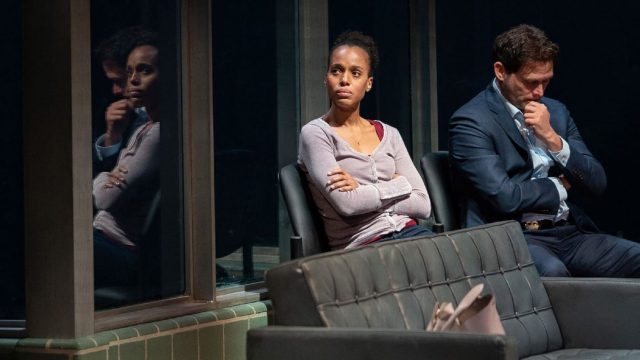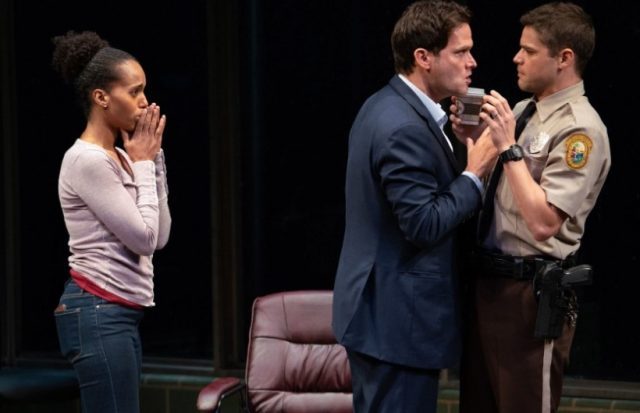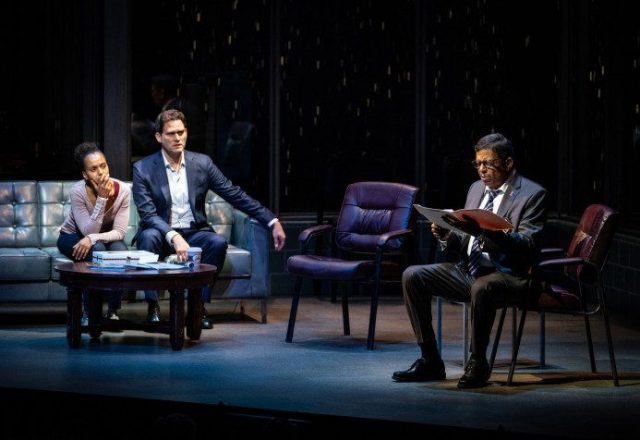
Kendra (Kerry Washington) and Scott (Steven Pasquale) reflect as they await important news in American Son (photo by Peter Cunningham)
Booth Theatre
222 West 45th St. between Broadway & Eighth Ave.
Tuesday – Sunday through January 27, $59 – $169
americansonplay.com
Christopher Demos-Brown’s American Son is a blistering, explosive play, a searing deep dive into systemic and institutionalized racism in contemporary America. The story takes place in real time in a Miami police station as a storm rages, torrents of water pouring down outside tall glass windows, mixing with ever-threatening thunder and lightning reminiscent of a horror movie. (The set is by Tony-winning design master Derek McLane, with sound by Peter Fitzgerald and lighting by Peter Kaczorowski.) It’s 4:12 in the morning, and Kendra Ellis-Connor is desperate to locate her eighteen-year-old son, Jamal, a solid kid who has not come home and is not answering his phone. She is frustrated with police officer Paul Larkin, who insists that Kendra wait until the public affairs liaison officer arrives for his shift at 8:00 to find out anything. Kendra’s estranged husband, Scott Connor, shows up and tries to force further information out of Larkin regarding Jamal’s whereabouts, but he is only mildly successful. Ultimately, the liaison officer, Lt. John Stokes, comes in early, but things don’t get any easier for Kendra and Scott, who are getting angrier by the minute, but not just at the cops.

FBI agent Scott Connor (Steven Pasquale) has some choice thoughts for Officer Paul Larkin (Jeremy Jordan) as Kendra (Kerry Washington) looks on in scintillating play at the Booth (photo by Peter Cunningham)
Color-blind casting might (deservedly) be all the rage on Broadway, but the color of each character’s skin is critical to the narrative in American Son as Demos-Brown and director Kenny Leon investigate ripped-from-the-headlines issues of identity, societal perceptions, stereotyping, racial profiling, ingrained prejudice, and cultural biases. Kendra (Kerry Washington) is a black psychology professor who says, “I don’t know I’ve had a sleep-filled night since that boy was born,” constantly fearful that something bad will happen to Jamal because of his race. Scott (Steven Pasquale) is a white FBI agent who wants his son to follow him into law enforcement, putting him on a path to attend West Point, but, not being black, Scott doesn’t share the same worries as Kendra, hoping, “This is just some frivolous nonsense. He probably just had his music cranked up too loud.” Officer Larkin (Jeremy Jordan) is white and has not been properly trained to handle this kind of incendiary situation, assuming that a black teenager out for the night must be part of a posse looking for trouble. “I completely understand your concern,” Larkin tells Kendra, who responds, “Respectfully, Officer — I don’t think you do.” Larkin adds, “Ma’am — I have kids too, OK?” “Any of ’em black?” Kendra says. And Stokes (Eugene Lee) is black, a seasoned officer who is not so quick to see things from Kendra’s or Scott’s points of view; “Settle down now. Settle down,” Stokes declares, but instead of calming the situation, he, well, continues to stoke the fire.

Kendra (Kerry Washington) and Scott (Steven Pasquale) listen intently to Lt. Stokes (Eugene Lee) in American Son (photo by Peter Cunningham)
A white civil trial attorney from South Florida whose previous plays (Fear Up Harsh, Wrongful Death and Other Circus Acts) have dealt with sociopolitical subjects involving different kinds of justice, Demos-Brown was inspired to write American Son — his Broadway debut — by real-life events and Ta-Nehisi Coates’s National Book Award winner, Between the World and Me, a letter the author pens for his adolescent son about what it’s like to grow up black in the United States. In fact, the script includes an epigraph from the book: “Race is the child of racism, not the father.” Black Tony-winning director Leon (A Raisin in the Sun, Stick Fly), a protégé of August Wilson’s, maintains a sizzling-hot pace, but he and Demos-Brown don’t take sides; all four characters are both guilty and innocent, and yet none of them are as well. The problem is bigger than just four people, each of whom gets to share their perspective. The audience, more racially diverse than at most Broadway shows, is also implicated, each person bringing his or her own personal history and biases with them; be prepared to hear laughs or gasps at certain times when you’re not reacting the same way as those sitting around you, the differences very much representative of the race of the audience member.
All four actors give dynamic, honest performances, led by Washington (Race, Scandal), a mother of two small children, a boy and a girl; at a postshow discussion the night I went, Washington talked about the fears black mothers have for their sons, something that brought even more intensity to her performance. (The play, which continues at the Booth through January 27 and boasts such producers as Nnamdi Asomugha, Jada Pinkett Smith, Shonda Rimes, Dwyane Wade, and Gabrielle Union-Wade, comes with a discussion guide from the Opportunity Agenda that addresses the concept of equal justice under the law, police-community relations, and racially motivated violence.) Pasquale (Junk, Rescue Me) finds just the right balance as Scott, who doesn’t get a pass just because he’s a white man who married a black woman and has a biracial teen. American Son wisely avoids clichés and melodrama, although there is some emotional manipulation, but it’s easy to look past that and immerse yourself in the onstage dilemma — and wonder what you would do if you were any of the four characters, or the most important missing fifth one, Jamal himself.